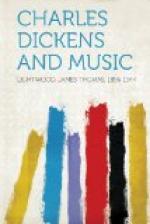Hear my prayer, O Heavenly
Father,
Ere I lay me down
to sleep;
Bid Thy angels, pure and holy,
Round my bed their
vigil keep.
It has already been pointed out (see Choir, February, 1912) that this hymn appeared in the Christmas number of Household Words for 1856, in a story entitled The Wreck of the Golden Mary. The chief authorities on the works of Dickens claim it as his composition, and include it in his collected works. On the other hand, Miller, in his Our Hymns (1866), states that Miss Harriet Parr informed him that the hymn, and the story of Poor Dick, in which it occurs, were both her own. We may add that when Dr. Allon applied for permission to include it in his new hymn-book Dickens referred him to the authoress.
Dr. Julian takes this as authoritative, and has no hesitation in ascribing the hymn to Miss Parr. On the other hand, Forster records in his Life of Dickens that a clergyman, the Rev. R.H. Davies, had been struck by this hymn when it appeared in Household Words, and wrote to thank him for it. ’I beg to thank you,’ Dickens answered (Christmas Eve, 1856), ’for your very acceptable letter, not the less because I am myself the writer you refer to.’ Here Dickens seems to claim the authorship, but it is possible he was referring to something else in the magazine when he wrote these words, and not to the hymn.
[14] Dickens frequently uses the word in this sense.
Tom Pinch says, ’I
shall punish the Boar’s Head
tremendously.’
It is also interesting to note that
Dickens uses the phrase
‘I don’t think’ in its modern
slang meaning on at
least two occasions. Tom Pinch
remarks ’I’m
a nice man, I don’t think, as John used
to say’ (M.C.
6), and Sam Weller (P.P. 38) says
to Mr. Winkle ’you’re
a amiably-disposed young man,
sir, I don’t think.’
Mark Tapley uses the expression
‘a pious fraud’
(M.C. 13).
[15] ‘Pet’ (L.D. 2) was a frequent visitor to the Hospital.
[16] From the poem on Industry.
CHAPTER VI
SONGS AND SOME SINGERS
The numerous songs and vocal works referred to by Dickens in his novels and other writings furnish perhaps the most interesting, certainly the most instructive, branch of this subject. His knowledge of song and ballad literature was extraordinary, and he did not fail to make good use of it. Not only are the quotations always well chosen and to the point, but the use of them has greatly added to the interest of such characters as Swiveller, Micawber, Cuttle, and many others, all of whom are of a very musical turn of mind. These songs may be conveniently divided into three classes, the first containing the national and popular airs of the eighteenth century, of which ‘Rule Britannia’ and ‘Sally in our Alley’ are notable examples. Many of these are referred to in the following pages, while a full list will be found on pp. 135-163.




